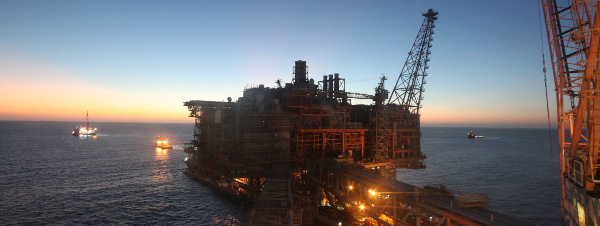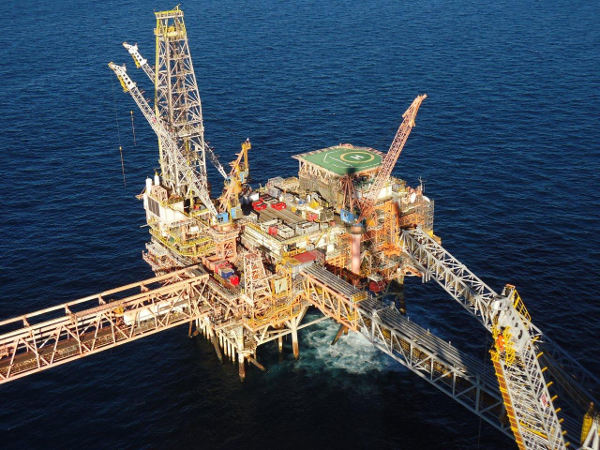WelderDestiny › Welding Jobs › Oil Rig Welder Jobs
Oil Rig Welder Jobs
Within our context, an oil rig Welder is defined as a general purpose Welder operating on an off-shore exploration or production facility in the oil and gas industry. Often this job is also called an off-shore Welder. This does not include subsea pipeline welding. For information on off-shore pipeline welding, click here. Within this context, welding is not a core activity from the perspective of the facility you are operating on, therefore you will be part of the support crew helping to keep the facility going.
The WelderDestiny Compass: Weekly e-zine Subscription
You can take a look at "The WelderDestiny Compass" back-issues by clicking here.
Generally
there will only be 1 or 2 Welders stationed on any facility, therefore you will
be required to manage just about all the welding requirements that arise. The
environment is however not one of high productivity, therefore the automated
welding processes do not feature much. (This situation changes during construction or shut-down projects.)
One of the main issues is that as an oil rig welder, you will be working on a hazardous facility. This means that the potential for explosive atmospheres are ever present. Any welding done in the field therefore needs to be done under very strictly controlled conditions. This normally includes working under strict "permits to work" and also welding within pressurized welding habitats. The pressurized habitat ensures that there is a constant positive air pressure inside the habitat (These days the habitats are typically made from a plasticized fabric material that is supported off a scaffolding structure, and is pressurized internally. The older type was constructed from plywood.) so that no flammable gasses can enter the habitat and result in an explosion. The habitat also ensures that no sparks can escape outside of the controlled area. Many off-shore facilities do have their own welding bays with built-in explosion proofing. This is where the oil rig Welder will perform small welding jobs that can be removed from the production area.
 Gas Production Platform at Dusk
Gas Production Platform at DuskTypical Oil Rig Welder Skills
Much
of the work of an off-shore oil rig Welder is associated with small maintenance type
jobs, which are usually rather straight forward, (e.g. Making up small pipe
supports and brackets.) but every so often there is the requirement to weld a
myriad of different Corrosion Resistant Alloys. (CRA) Therefore the off-shore
welder needs to be able to do this confidently, and in difficult circumstances
and welding positions. Being an oil rig Welder should not be seen as a job for
someone that is inexperienced.
The
main welding processes / techniques that the oil rig Welder needs to be able
to use are:
- Gas Tungsten Arc Welding: (GTAW) This is the main process for performing the root runs of single sided welds in piping, and often for the entire weld when welding Corrosion Resistant Alloys (CRA's) or thin materials of any kind.
- Shielded Metal Arc Welding: (SMAW) This is the main process used for depositing fill and cap passes on piping, and to also perform welds on structural steel components. For some single sided structural steel welds you may be required to deposit the root run with SMAW. This is typically done with an electrode such as the E7016 electrode. (A popular electrode for this purpose is the Kobe E7016 electrode, therefore this welding is often know as "welding a Kobe root".)
- Flux Cored Arc Welding: (FCAW) As this process is best suited to high deposition welding, it is generally only used where jobs are done that requires a lot of weld metal to be deposited. This is not usual for maintenance type work in an off-shore environment, therefore you may be able to get by without having this qualification under your belt. Some off-shore facilities are just not set up to use this process, so never use it in any case. For larger structural jobs however, more and more companies are using FCAW, therefore it is a good skill to have.
Materials Typically Welded
There
are many different systems, using numerous different materials on an off-shore
facility. This means that as an oil rig Welder you need to have experience
welding a wide array of different materials with many different welding
consumables.
The
typical materials welded are:
- Carbon Steels: Most structures and some piping will be carbon steel.
- Austenitic Stainless Steels: (ASS) Typically 316 and other Molybdenum containing stainless steels are used, as they are more resistant to pitting than the non Molybdenum containing stainless steels such as 304. Pitting resistance is obviously important in an off-shore environment.
- Duplex and Super Duplex Stainless Steels: (DSS and SDSS) These materials have better corrosion resistance, especially stress corrosion cracking resistance, than the ASS. They are however more critical when it comes to the welding.
- Super Austenitic Stainless Steels: (SASS) These have better corrosion resistance than the ASS, but are somewhat more difficult to weld.
- Nickel Based Alloys: (NBA) Nickel based alloys are used under critical high temperature conditions, and NBA welding consumables are also used when welding some dissimilar metal welds. The off-shore welder therefore needs to know how to weld with these welding consumables.
- Copper Nickel: (CuNi) This is often used in off-shore salt water systems such as fire water and deluge piping.
- Titanium: In some exceptional sea water applications Titanium will be used. This is however a very minor application, and given the specialized knowledge and equipment required to weld it, it will seldom be required for the off-shore Welder to weld this.
The
oil rig Welder therefore needs to be able to weld all the materials mentioned
above with the GTAW process, and also be able to weld the carbon steels and ASS
with the SMAW process. (At least)
 Off-Shore Gas Production Platform
Off-Shore Gas Production PlatformFurther Requirements for Off-Shore Personnel
Any
off-shore work also carries other risks that the oil rig Welder will face,
and is therefore required to have additional certifications for. Typically
these are:
- Must be able to pass the required off-shore medical. While this medical is not that onerous, somebody with significant health issues will not be able to pass this test.
- Must have done helicopter underwater escape training. (HUET) This is a relatively physical course including being dunked under water in a simulated helicopter crash and then being able to escape from this situation. Don't worry, even people that can't swim are able to complete this training, although it can be somewhat difficult for them. If you fall into this category, please make sure that the trainers know so that they are attentive to your needs.
- Must have attended and passed the off-shore survival skills course. Typically this comes in the tropical survival and cold water survival varieties. The cold water survival course being a bit more rigorous and is needed when the work is done in cold water environments like the North sea. Often this course and the HUET course is done "all in one".
- Most jurisdictions will also require the off-shore worker to pass some kind of police check to certify that the person has not been convicted of crimes typically associated with maritime activities. (Think smuggling etc.)
- Company specific safety training is also usual, but such training will be included as part of your "on-boarding" process with the specific employer.
Please
understand that when performing hot work on an off-shore facility, the absolute
number one priority for the oil rig welder is safety. Being responsible for igniting a fire or
creating an explosion is not something you want to have to live with. (If you
survive.) On a hazardous off-shore facility, much can be forgiven, but a lack
of safety awareness is not one of those things. Anybody that appears to be a
safety risk off-shore will be quick to be placed on the next helicopter to
shore. Take this seriously. Be proactive in safety. Get the correct permits.
Follow the rules. Your life and the lives of your mates are at stake.
Oil Rig Welder Lifestyle
A
very important aspect of being an oil rig Welder is the lifestyle that comes
with it. This is not your typical 9 to 5 job, so you need to understand that it
will significantly impact your home life. For single people this is not necessarily
a big problem, but for those in long term relationships this can cause
significant stress.
The
life of an oil rig Welder typically comprises the following:
- Fly-in fly-out work arrangements: (FIFO) These arrangements can vary greatly from project to project, but it means that you will spend a lot of time away from home. At least half the time if you have a really good roster, or significantly more than that if your roster is not so generous.
- Long working hours: Typical work hours are 12 hour shifts, 7 days a week while you are on the job. This leaves you with little spare time to do other activities.
- Staying in communal living arrangements: Most off-shore facilities require you to share bedrooms with one or more other people. Normally the catering arrangements are taken care of, and eating is in communal dining rooms. As a general rule the food is good, so keeping fit and slim is a big challenge!
Something
else that can be a challenge for oil rig Welders is to keep up their skill
levels. You may go off-shore with a lot of skills and codings, but often the
work can be somewhat menial for months on end, meaning that you lose your edge
welding some of the more exotic materials. Try to organize some CRA consumables
and pipe to practice on from time to time. Also ask to attend some refresher training while you are on your "off-swing".
WelderDestiny › Welding Jobs › Oil Rig Welder Jobs
The WelderDestiny Compass: Weekly e-zine Subscription
You can take a look at "The WelderDestiny Compass" back-issues by clicking here.